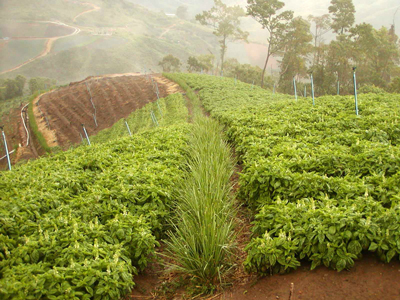热带草可用来制作奢侈香水
有种热带草的根给海地农民带来了希望。据CCTV报道,这种香根草植物含有制作奢侈香水的成分。
The root of a hardy tropical grass is bringing hope to Haitian farmers. As CCTV’s Malini Wilkes reports the vetiver plant contains an ingredient used to make expensive perfumes and colognes.
It’s a long way from this rugged hillside in southwestern Haiti, where barefoot farmers are hacking at tropical grasses…to the shelves of high-end stores where fragrances containing oil from the Haitian vetiver plant can sell for 200 dollars a bottle.

Vetiver plant
Pierre Leger is a Haitian agronomist who revived the country’s vetiver farming program in the 1980s.
"Farmers in the south are so happy with the vetiver because they make money out of it. They make a lot of money," Pierre Leger said.
"The real money is being made by oil producers, exporters, and really, the perfume and scent industry,” vetiver expert Scott Freeman said.
Some farmers have seen rising incomes as Western fragrance companies have organized local cooperatives to increase vetiver production. But it’s all relative. Many workers still make between five and ten U-S dollars a day.
"You have a small bottle of vetiver that sometimes can go for $200. The farmers are making an incredibly small fraction of that for every harvest that they do. At the same time, they are losing a lot of their soil off of the hillsides that’s being washed off,” Scott Freeman said.
Vetiver’s aromatic, woodsy scent is a base for many well-known luxury fragrances. That’s why the industry is beginning to make long-term investments to preserve the environment and develop local infrastructure.
"Haiti is the largest producer of vetiver in the world, and it also has the reputation of the best vetiver in the world. So it’s in the interest of the perfume industry to make sure that farmers are well-compensated and that the environmental degradation doesn’t really halt the vetiver production," Scott Freeman said.
The plant is an agricultural treasure in a country that could use some good fortune. Haiti is the poorest nation in the Western hemisphere-- with 80 percent of the people living in poverty.